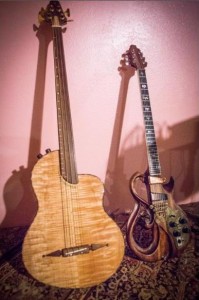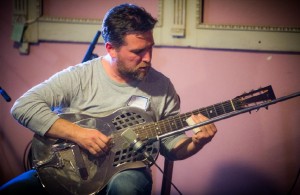ABOUT SVII:
Is Technology, Business, or the Arts the key to the future?The answer is all three, together.
The Silicon Valley Innovation Institute (SVII) seeks interns to join a team of vibrant volunteers out to change the world through intelligence, soul, and action. Our mission statement at SVII is to “Turn Vision Into Value”, and as a community, to support other innovative kindred spirits to do the same. We represent the spirit of the Silicon Valley, and we believe in the power of innovation in paving the way of the future.
COMPENSATION:
– Unparalleled networking opportunities (Interact with accomplished entrepreneurs, artists, and some of the most brilliant folks from all around the Bay and beyond!)
– Add valuable experience to your portfolio/resume
– Complimentary ticket to SVII’s monthly innovation events
– Be a part of cultivating this globally influential community, and help to put on the most intellectually stimulating, and emotionally poignant events every month around topics relevant to innovatorsROLE:
You will report to the Executive Director, and will be responsible for one of the following sample sets of responsibilities within SVII’s operations:Web Design / Development: Help to revamp the SVII website to even more accurately reflect the community and its members and activities.
Marketing/Community Ambassador: Strategize and implement (fun!) and creative ways to broaden our impact and grow our community; Think outside the box to bring our stellar monthly events in front of new audiences and potential kindred spirits
Social Media Marketing: Help to promote our monthly events, and raise awareness and brand recognition through social media (Facebook, Twitter, LinkedIn, Google Analytics, etc.)
Event Organization: A lot of details go into our monthly innovation events – Work with Executive Director to ensure that each monthly Wed event is logistically successful
Innovation Blogger: Create interesting and stimulating blog post recap of each monthly event; Contribute other blogs entries around topics in innovation
Video Production Team: Capture footage (AV) for monthly innovation events; Edit footage into a single attention grabbing short film that captures the essence of the evening (for distribution on the SVII website and promotion to the Silicon Valley and global innovation communities); Writers with ideas for more unconventional coverage videos also welcome
It’s hard to master innovation from school books. We will customize each internship position we fill to create the most suitable synergy between you and SVII. If interested, get in touch!
innovation
JAN 16th 2013 (Video Recap): Innovation 2013 – New Year’s Party!
Innovative Expressions (June Impressions)
This post has a new home:
How is technology changing music? (June event recap)
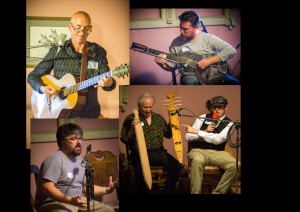
JUNE 5th 2012 (Recap): How is technology changing music?
The Silicon Valley Innovation Institute is all about innovation, whatever the form. Last week, we had a fabulous event focusing on innovation in music–specifically, as the title of the event asked, “How is technology changing music?”
The evening began with casual mingling and chatting. During this time, even though they were not an official part of the program, the entrepreneurs from Unplugged Instruments got the night off to a good start by showing off their super cool self-amplifying guitar (available through kickstarter).
Then we had dinner from the fine fare of Angelica’s Bistro (also the location of this event) while music was played by Scot Sier and Andy Markham, followed by a stunning Bolero dance by Roland Van Der Veen and Jessie Chen.
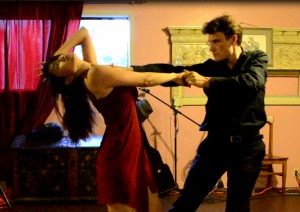
All this happened before the main program, which was an extended exploration of how technology is changing music (for better or for worse). Mostly, it was agreed that technology is helping music by, as SVII founder Howard Lieberman put it, “lowering the barriers to entry and allowing artists to reach more people with their music.” However, there were also some hints that it may not all be good. For example, Andy Markham, a guitarist from The Cat Mary, pointed out that “There is no law of the universe that dictates that music needs to be a way of making money.” Just as brick-laying is a profession that is now all-but-extinct, in five hundred years, technology may have made music so easy to produce that being a professional musician will be an impossibility. (He didn’t necessarily say that such a scenario has to be a bad thing, but whether it is or not would probably depend on your perspective.)
One thing that is for sure is that technology has changed music immensely. Even in the change, however, one can see the cyclical nature of music (rhythm, anyone?). For example, because technology such as iTunes, Youtube, Spotify, and BitTorrent (to name a few) have made music anywhere from cheap to free online, musicians have become much more dependent on revenue from live performances, which is somewhat of an echo of past times.
Additional juxtapositions of the new and old in music and technology were also highlighted by the other panelists. Budda Amplification founder Scot Sier talked about how he got the idea for his current company: At one time, he had a tube amplifier, but then he sold it. After that he realized how much he missed it, because it sounds much better at a lower volume than other amplifiers, which is important for preserving your hearing if you are a musician. This inspired him to start a company which would actually make tube amplifiers, which before then had been a dying breed.
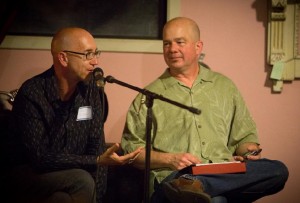
Also present were the father-son-instrument-
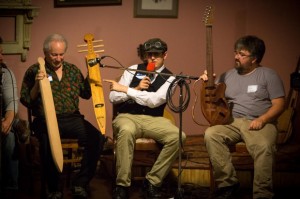
One of the highlights of the night was when Robert Hamilton of Smule showed a visualized version of people from all over the world singing “Lean on Me” together through the Smule Glee app (online karaoke and music collaboration). After the tsunami in Japan, someone in Japan posted the starter track as a way to encourage fellow Japanese people. Later, people from all over the world started hearing it and adding their own voices.
Another product that Smule makes is electronic instruments for computers–i.e, ways of playing music through your iPhone, iPad, etc. Hamilton mentioned that one of their most popular settings on the My Ocarina app for the iPhone is the Zeldarian setting, which mimics the way an ocarina in the Zelda computer game sounds, which is (as far as we know) not reproducible by an acoustic instrument. This echos something which Eli said about the flow of technology: “Technology tries to mimic the physical world, which forces us to learn more about the physical world by studying it more deeply. Then we take the physical and try to mimic technology, which forces us to learn more about technology.”
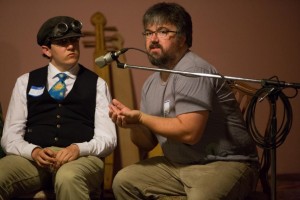
——————————————————————————————————————–
SVII is the Silicon Valley Innovation Institute. We aspire to cultivate innovation by bringing creative people of all types together in a thought-provoking environment. Our next event is July 18th, and is an opportunity for anyone to showcase their creativity and audacity in performance and art.
